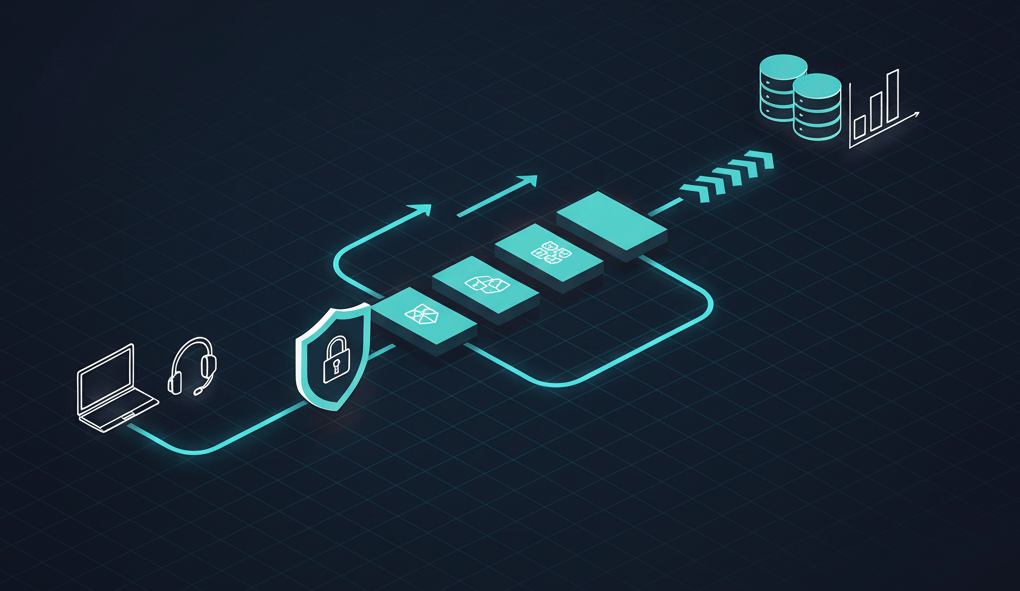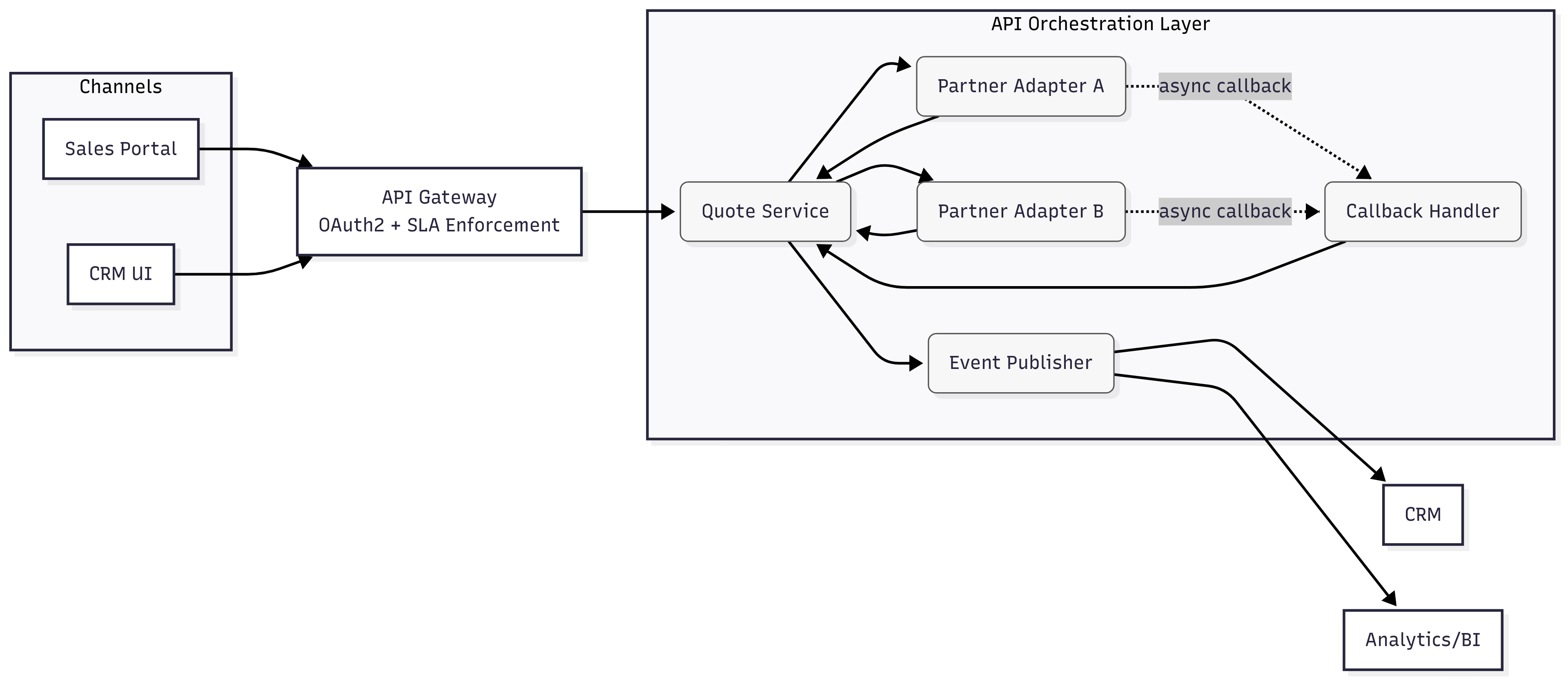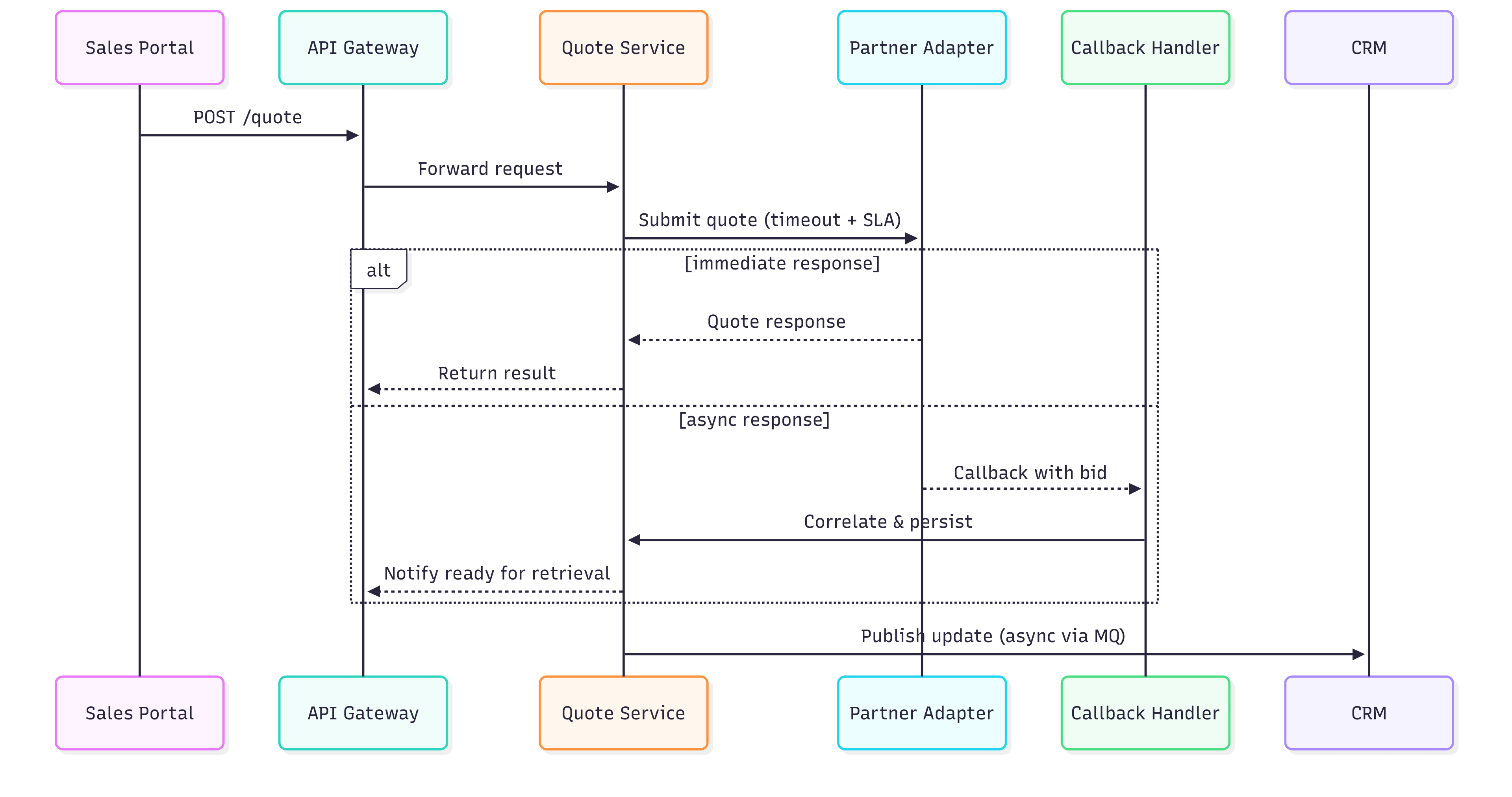Fortune 500 Logistics Provider — Quote Management & Marketplace Bidding Platform

Summary
Delivered an API-led quote and bid management platform that unified quoting flows across multiple marketplace partners, applying timeouts, callbacks, and SLAs to guarantee predictable turnaround. The platform shortened quote cycles and increased win-rate capacity by ensuring governed partner interactions and clean revenue-line handoffs.
Problem
- Quotes and bids were exchanged through heterogeneous partner APIs with inconsistent SLAs and error semantics.
- Manual follow-ups and missed callbacks led to delays and lost deals.
- Channels and sales teams had no consistent mechanism for tracking quote lifecycles or measuring turnaround performance.
Solution Mechanics
Primary pattern: API-led orchestration (Java + Spring Boot).
-
API Gateway & security
Azure API Management (APIM) enforcing OAuth2, idempotency keys, timeouts, and retry budgets for partner calls. -
Quote Service (Spring Boot)
- Normalizes incoming quote requests from sales channels.
- Manages bid payload transformation for each marketplace partner.
- Persists quote lifecycle state in Postgres (with audit trails).
-
Callback Handler (Spring Boot)
- Listens for partner bid responses via callback endpoints.
- Correlates callbacks to original requests using correlation IDs.
- Publishes updates to RabbitMQ for downstream CRM and analytics systems.
-
Partner Adapters
- Each marketplace partner (internal/external) has a dedicated adapter handling payload mapping, SLA enforcement, and error normalization.
- Adapters are swappable modules to ease partner onboarding/offboarding.
-
Data & state
- Postgres for quotes, SLA tracking, and outcomes.
- Redis for short-lived state (timeouts, in-progress request tracking).
- Micrometer → Grafana dashboards for SLA compliance and latency/error metrics.
Diagram 1 - Context Diagram — API façade for quotes and bids

Diagram 2 - Sequence — Quote request with callback flow

Process Flow
- Channel/Sales team submits a quote request to the Quote API.
- API validates, assigns correlationId, and persists the request in Postgres.
- Quote Service calls the Partner Adapter for the relevant marketplace with timeouts (e.g., 3s/5s) and retry budget.
- If partner responds inline → Quote Service processes and records immediately.
- If partner requires async flow → the Callback Handler exposes a secure endpoint for bid response.
- Partner calls back → Callback Handler verifies authenticity, correlates by correlationId, and updates state in Postgres.
- Handler publishes updates into RabbitMQ, consumed by CRM/Analytics for sales visibility and revenue forecasting.
- SLA metrics (turnaround time, success/error rates) are captured and exposed via Grafana dashboards.
Outcomes
- Faster bid turnaround via strict SLA enforcement, idempotency, and async callbacks.
- Higher win-rate by reducing delays and ensuring all bids were received and tracked.
- Operational visibility with dashboards measuring turnaround, partner reliability, and pipeline impact.
Strategic Business Impact
- +$2–6M annualized revenue capacity (Modeled): Assumes average order value, bid volumes, and uplift in win-rate from faster turnaround.
- Reduced lost deals (Proxy): Callback governance ensures fewer dropped or missed bids.
- Partner agility (Proxy): Standardized adapters cut time to onboard new marketplaces.
Role & Scope
Owned architecture and delivery leadership for API gateway, Spring services, partner adapters, callback handler, SLA metrics, and downstream integrations with CRM and analytics.
Key Decisions & Trade-offs
- API-led orchestration vs point-to-point partner calls: governance, observability, and contract stability at the cost of extra layer.
- Async callbacks vs blocking calls: faster UX and SLA guarantees, but required correlation + audit.
- Adapter-per-partner simplified lifecycle but introduced module management overhead.
- Strict SLA/timeouts improved predictability but required tuning and retry strategies.
Risks & Mitigations
- Partner SLA violations → monitored via dashboards, escalations, and circuit breakers.
- Callback failures → retries with exponential backoff and DLQs in RabbitMQ.
- State drift → reconciliation jobs to ensure CRM and Postgres alignment.
- Volume spikes → horizontal scaling of Quote Service and Callback Handler.
Suggested Metrics (run-time SLOs)
- Quote turnaround p95 (request → partner response).
- Callback success rate and retry depth.
- Partner-specific error rate and SLA compliance.
- Bid win-rate uplift compared to baseline.
- CRM update lag (event publish → CRM persist).
Closing principle
Govern every partner interaction with SLAs and callbacks—because in marketplaces, the difference between a won deal and a lost one is often just seconds.